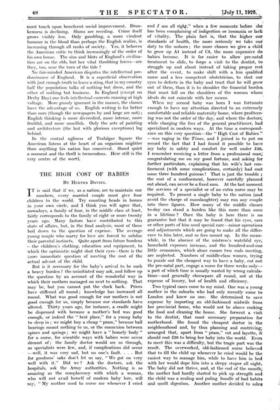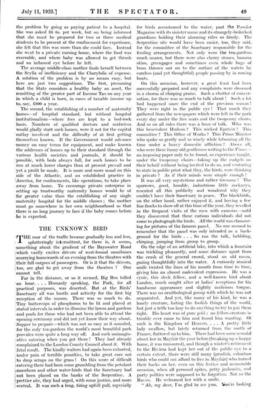THE HIGH COST OF BABIES
BY HERTHA DAVIES.
IT is said that if we, as a nation, are to maintain our numbers, every married couple must give four children to the world. Try counting heads in homes in your own circle, and I think you will agree that, nowadays, a family of four, in the middle class at least, fairly corresponds to the family of eight or more twenty years ago. Many factors have contributed to this state of affairs, but, in the final analysis, most of these boil down to the question of expense. The average young couple who marry for love are forced to subdue their parental instincts. Quite apart from future burdens —the children's clothing, education and equipment, to which the optimistic might shut their eyes—there is the ---aore immediate question of meeting the cost of the actual advent of the child.
But is it necessary for the baby's arrival to be such a heavy burden ? the uninitiated may ask, and follow up the question by an account of the wonderful way in which their mothers managed on next to nothing. That may be, but you cannot put the clock back. Prices have stiffened all round ; knowledge has. increased all round. What was good enough for our mothers is not good enough for us, simply because our standards have altered. Thirty years ago, for instance, a cradle might be dispensed with because a mother's bed was good enough, or indeed the " best place," for a young baby to sleep in ; we might buy a cheap " pram," because ball bearings meant nothing to us, or the connexion between spines and springs ; we might have a " homely body " for a nurse, for scientific ways with babies were never dreamt of ; the family doctor would see us through, as specialists were few, and, if complications did occur —well, it was very sad, but no one's fault. . . . But for goodness' sake don't let us say, " We got on very well with it." Did we ? Ask the doctors, ask the hospitals, ask the Army authorities. Nothing is so amazing as the complacency with which a woman, who will not avail herself of modern baby lore, will say, " My mother used to nurse me whenever I cried and I am all right," when a few moments before she has been complaining of indigestion or insomnia or lack of vitality. The plain fact is, that the higher our standards of health, the more seriously we take our duty to the unborn ; the more chance we give a child to grow up Al instead of C3, the more expensive do babies become. It is far easier to allow pre-natal treatment to slide, to forgo a visit to the dentist, to struggle up and about instead of taking proper rest after the event, to make shift with a less qualified nurse and a less competent obstetrician, to shut our eyes to defects in the baby and trust that he will grow out of them, than it is to shoulder the financial burden that must fall on the shoulders of the woman whose ideals do not coincide with her means.
When my second baby was born I was fortunate enough to have my attention directed to an extremely comfortable and reliable maternity home, where profiteer- ing was not the order of the day, and where the doctors; while charging the fees of the general practitioner, had specialized in modern ways. At the time a correspond- ence on this very question—the " High Cost of Babies "; —was raging in the Times, and I joined in to put on record the fact that I had found it possible to have my baby in safety and comfort for well under 1-40, I remember receiving a letter from a professional man; congratulating me on my good fortune, and asking for further particulars, explaining that his wife's last con- finement (with some complications, certainly) had cost some three hundred guineas ! That is just the trouble ; the cost of a confinement, however carefully planned out ahead, can never be a fixed sum. At the last moment the services of a specialist or of an extra nurse may be required. To present a single baby to the nation (and avoid the charge of manslaughter) may run any couple into three figures. How many of the middle classes to-day can stand a burden like this more than once in a lifetime ? Once the baby is here there is no guarantee but that it may be found that his eyes, ears or other parts of him need special care—minor operations and adjustments which are going to make all the differ- ence to him later, and so fees mount up. In the mean- while, in the absence of the mistress's watchful eye; household expenses increase, and the hundred-and-one little economies, which alone ensure two ends meeting, are neglected. Numbers of middle-class women, trying to puzzle out the cheapest way to have a baby, cut out the pre-natal part, engage a nurse for three weeks only— a part of which time is usually wasted by wrong calcula- tions—and generally cheesepare all round, not at the expense of luxury, but of health and efficiency.
Two typical cases come to my mind. One was a young mother in the suburbs who had only recently come to London and knew no one. She determined to save expense by importing an old-fashioned midwife from her provincial home, who would not be above cooking- the food and cleaning the house. She forwent a visit to the dentist, that most necessary preparation for motherhood. She found the cheapest doctor in the neighbourhood and, by thus planning and contriving; arranged that, apart from " pram," cot and layette, it should cost £20 to bring her baby into the world. Even to meet this was a difficulty, but the tragic part was the result. The overworked, old-fashioned nurse believed that to fill the child up whenever he cried would be the easiest way to manage him, while to have him in bed with her would dope him into a sleepy stupor all night. The baby did not thrive, and, at the end of the month; the mother had hardly started to pick up strength and. the child was a muling and puling bundle of bad habits and spoilt digestion. Another mother decided to solve the problem by going as paying patient to a hospital. She was asked £6 6s. per week, but on being informed that she must be prepared for two or three medical students to be present at the confinement for experience, she felt that this was more than she could face. Instead she went to a private nursing home, where the food was execrable, and where baby was allowed to get thrush and an inflamed eye before he left.
The average middle-class mother finds herself between the Scylla of inefficiency and the Charybdis of expense. A solution of the problem is by no means easy, but here are_ just two suggestions. The first, presuming that the State- considers a healthy baby an asset, the remitting of the greater part of Income Tax on any year in which a child is born, in cases of taxable income up to, say, £800 a year.
The second, the establishing of a number of maternity homes—of hospital standard, but without hospital :institutionalism—where fees are kept to a bed-rock ,basis. Numbers of qualified doctors and midwives would gladly start such homes, were it not for the capital outlay involved and the difficulty of at first getting themselves known. If the Government would advance 'money on easy terms for equipment, and make known the addresses of homes up to their standard through the various health societies and journals, it should be possible, with beds always full, for such homes to be run at much lower charges than at present prevail and ' yet a profit be made. It is more and more usual on this side of the Atlantic, and. an established practice in !America, for confinements, like operations, to take place away from home. To encourage private enterprise in setting up trustworthy maternity homes would be of far greater value than the establishing of any single !maternity hospital for the middle classes ; the mother must go somewhere in her own neighbourhood so that !there is no long journey to face if the baby comes before he is expected.



























































 Previous page
Previous page